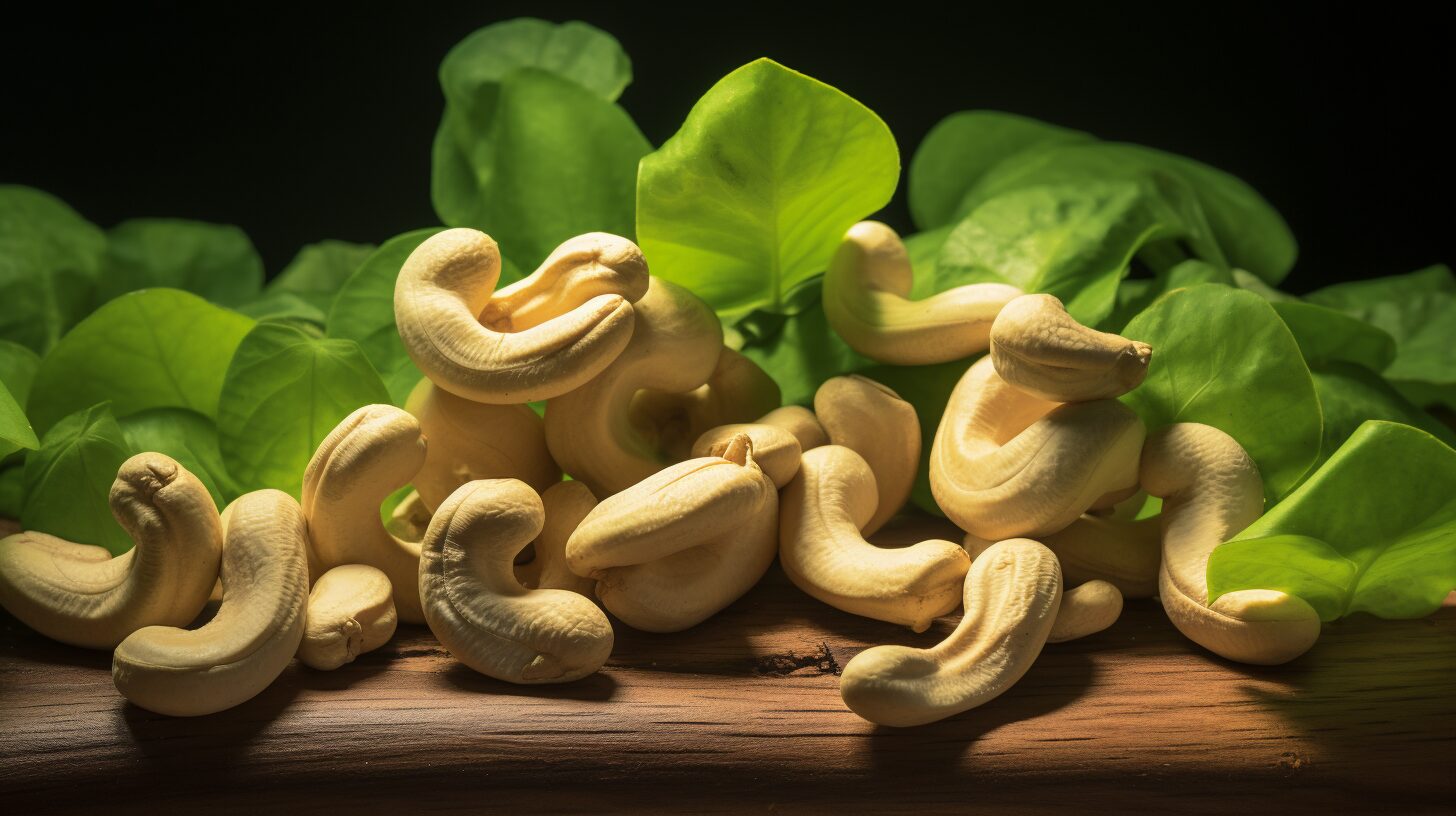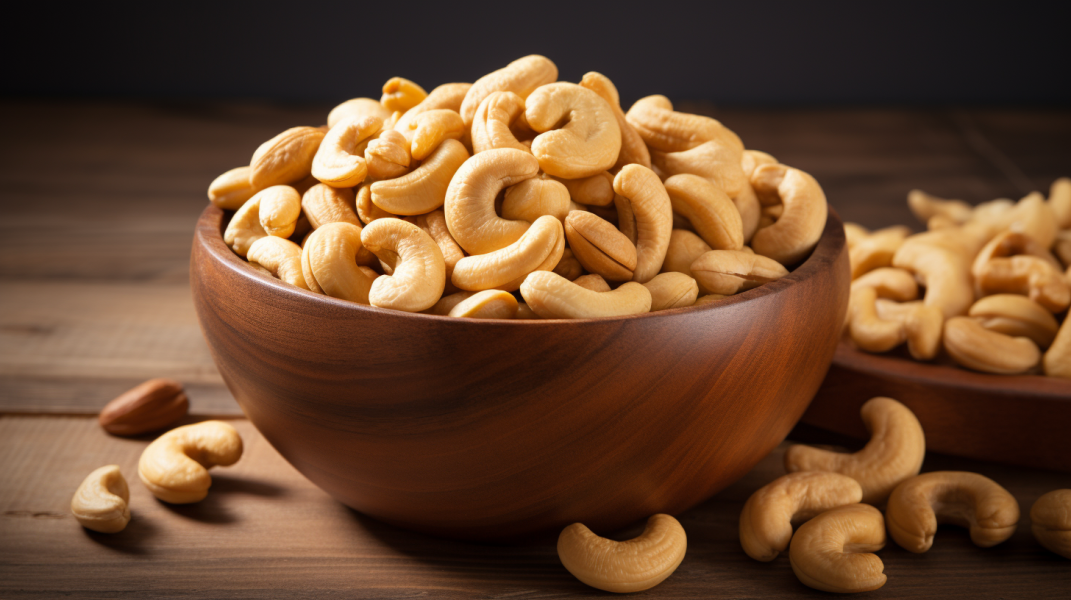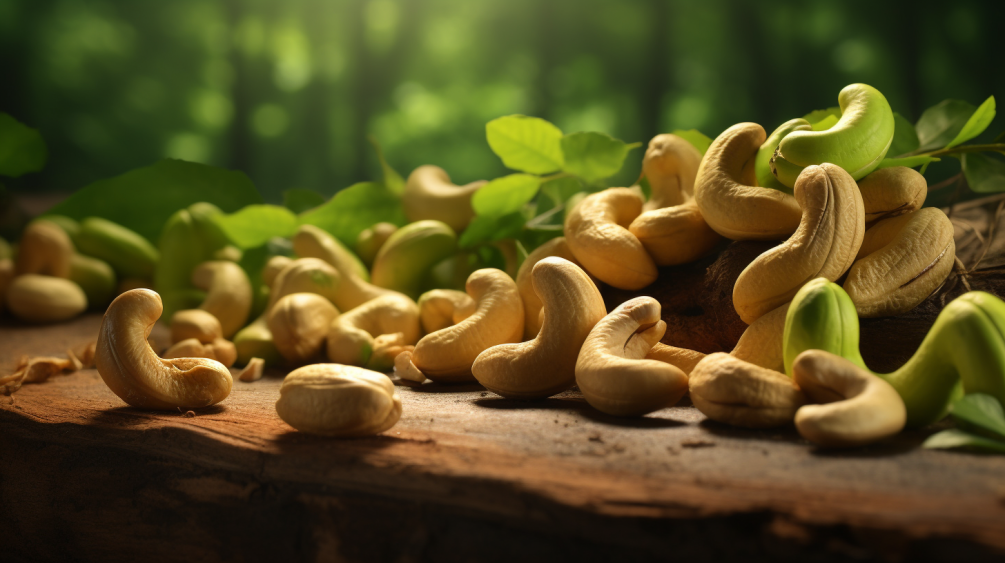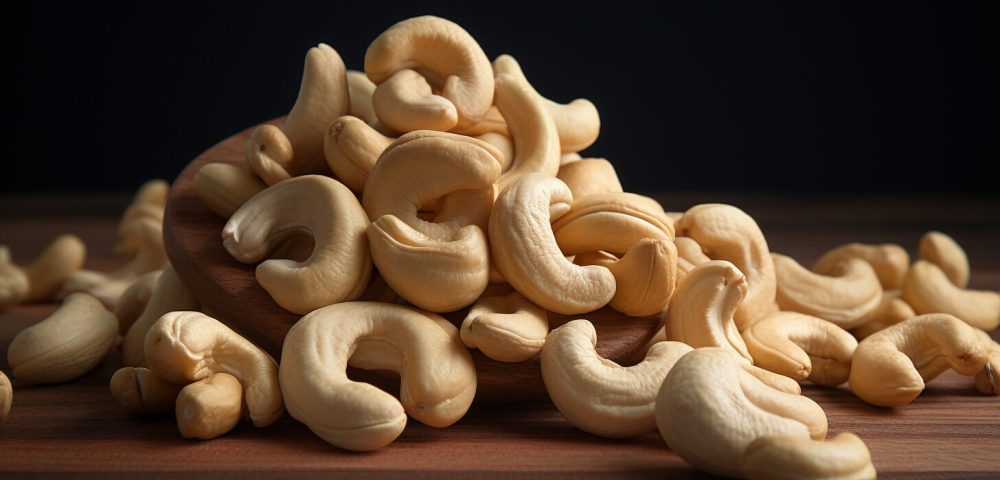Cashews, also known as the “nutty powerhouse,” are not only delicious but also packed with essential nutrients that contribute to overall health and well-being. Exploring the nutritional profile of cashews reveals a wide array of macronutrients and micronutrients that make them a valuable addition to a balanced diet. Cashews offer numerous health benefits, ranging from heart-healthy nutrients to improved brain function and enhanced bone health.
Cashews have been linked to the prevention of chronic diseases such as cardiovascular disease, type 2 diabetes, and cancer. Incorporating cashews into your diet can be done by snacking on them or adding them to various recipes. However, it is essential to be aware of potential side effects and precautions such as allergies, oxalate content, and portion control. Understanding the power of cashews and how to incorporate them wisely can help optimize your nutrition and well-being.
Page Contents
Nutritional Profile of Cashews
Cashews, these little powerhouses of nutrition, offer a rich and diverse nutritional profile. Let’s dive into their macronutrient and micronutrient content, uncovering the abundance of essential nutrients they provide. From protein-packed macronutrients to a wealth of vital micronutrients, discover how cashews can boost your overall health and well-being. Get ready to be amazed by the nutritional treasures that lie within these humble nuts.
Macronutrients in Cashews
Cashews are nutritious and delicious nut that are packed with macronutrients essential for overall health, including carbohydrates, proteins, and fats. In a serving size of 1 ounce (28 grams) of cashews, you can find approximately 9 grams of carbohydrates. These carbohydrates provide energy for the body and are important for fueling daily activities. Cashews also contain about 5 grams of protein per ounce, which is crucial for building and repairing tissues, as well as supporting the immune system.
When it comes to fats, cashews are a good source of healthy monounsaturated fats. In a serving of cashews, you can find around 12 grams of fat, with about 2 grams being saturated fat. These fats are important for providing energy, supporting cell growth, and protecting organs. It’s worth noting that while cashews do contain fats, they are primarily healthy fats that can actually benefit heart health when consumed in moderation.
Incorporating cashews into your diet can be a great way to boost your intake of these essential macronutrients. You can enjoy them as a snack on their own or add them to recipes for a satisfying crunch and added nutritional value. When it comes to macronutrients, cashews are a fantastic choice because they provide a good balance of carbohydrates, proteins, and healthy fats necessary for a well-rounded diet. So go ahead and enjoy munching on these nutrient-packed nuts!
I remember the time when I was training for a marathon and was looking for a nutritious snack to fuel my long runs. A friend recommended cashews to me, highlighting their high macronutrient content. I decided to give them a try and was pleasantly surprised by their delicious taste and satisfying crunch.
Not only did they provide the energy I needed for my runs, but they also kept me feeling full and satisfied. Incorporating cashews into my training routine not only enhanced my performance but also boosted my overall well-being. Now, whether I’m training for a marathon or simply need a healthy snack option, cashews are always my go-to choice.
Get ready to go nuts as we dive into the micronutrients hidden within the delightful cashew!
Micronutrients in Cashews

| Vitamin E | 37% of the Recommended Daily Intake (RDI) per 1 ounce |
| Vitamin K | 9% of the RDI per 1 ounce |
| Thiamin (Vitamin B1) | 10% of the RDI per 1 ounce |
| Vitamin B6 | 7% of the RDI per 1 ounce |
| Folate | 6% of the RDI per 1 ounce |
| Niacin (Vitamin B3) | 6% of the RDI per 1 ounce |
| Riboflavin (Vitamin B2) | 5% of the RDI per 1 ounce |
| Pantothenic Acid (Vitamin B5) | 2% of the RDI per 1 ounce |
| Copper | 29% of the RDI per 1 ounce |
| Magnesium | 20% of the RDI per 1 ounce |
| Zinc | 15% of the RDI per 1 ounce |
| Phosphorus | 13% of the RDI per 1 ounce |
| Manganese | 11% of the RDI per 1 ounce |
Micronutrients in cashews play a crucial role in maintaining overall health. Here are the key micronutrients found in cashews:
- Vitamin E: Cashews contain approximately 37% of the Recommended Daily Intake (RDI) of Vitamin E per 1 ounce. Vitamin E is a powerful antioxidant that helps protect cells from damage caused by free radicals.
- Vitamin K: Cashews provide about 9% of the RDI of Vitamin K per 1 ounce. Vitamin K is essential for blood clotting and plays a role in bone health.
- Thiamin: Cashews contribute to approximately 10% of the RDI of Thiamin (Vitamin B1) per 1 ounce. Thiamin is important for converting food into energy and supporting nerve and muscle function.
- Vitamin B6: Cashews contain around 7% of the RDI of Vitamin B6 per 1 ounce. Vitamin B6 is involved in brain development and function, as well as the production of neurotransmitters.
- Folate: Cashews provide about 6% of the RDI of Folate per 1 ounce. Folate is necessary for DNA synthesis and cell growth, making it essential for early pregnancy and overall health.
- Niacin: Cashews contribute to approximately 6% of the RDI of Niacin (Vitamin B3) per 1 ounce. Niacin is involved in energy metabolism and maintaining healthy skin.
- Riboflavin: Cashews contain around 5% of the RDI of Riboflavin (Vitamin B2) per 1 ounce. Riboflavin helps convert food into energy and supports normal growth and development.
- Pantothenic Acid: Cashews provide about 2% of the RDI of Pantothenic Acid (Vitamin B5) per 1 ounce. Pantothenic Acid is involved in the synthesis of hormones and cholesterol.
In addition to these vitamins, cashews are also a good source of essential minerals:
- Copper: Cashews contain approximately 29% of the RDI of copper per 1 ounce. Copper is essential for the production of red blood cells and the functioning of the immune system.
- Magnesium: Cashews contribute to around 20% of the RDI of magnesium per 1 ounce. Magnesium is involved in numerous bodily functions, including muscle and nerve function, maintaining a steady heartbeat, and supporting a healthy immune system.
- Zinc: Cashews provide about 15% of the RDI of zinc per 1 ounce. Zinc is important for immune system function, wound healing, and DNA synthesis.
- Phosphorus: Cashews contain approximately 13% of the RDI of phosphorus per 1 ounce. Phosphorus is necessary for strong bones and teeth, as well as proper cell function.
- Manganese: Cashews contribute to around 11% of the RDI of manganese per 1 ounce. Manganese is involved in the metabolism of carbohydrates, amino acids, and cholesterol.
Incorporating cashews into your diet can help ensure you receive these essential micronutrients. Whether you snack on them alone, add them to recipes, or enjoy them as a topping, cashews offer a delicious and nutritious way to boost your overall health.
Cashews have a rich history that dates back centuries. Originating from Brazil, they were brought to India and East Africa by Portuguese explorers in the 16th century. Cashew trees thrived in these regions due to the favorable climate and soil conditions.
Today, cashews are grown in various countries around the world, with Vietnam, India, and Ivory Coast being the largest producers. They are harvested by hand, as the cashew nut is enclosed in a shell that contains a toxic resin. The shell is carefully removed, and the cashew nut is then roasted to enhance its flavor.
Cashews have gained popularity not only for their taste but also for their nutritional value. They are a good source of healthy fats, protein, and fiber, making them a satisfying and nutritious snack option.
So, whether you enjoy cashews as a snack, in a stir-fry, or as a topping for salads, you can reap the benefits of their micronutrients while indulging in their delicious flavor. Incorporate cashews into your diet and enjoy the nutty powerhouse of essential nutrients that they provide.
Eating cashews not only satisfies your snack cravings, but also delivers heart-healthy nutrients, aids in weight management, boosts brain function, and strengthens your bones.
Health Benefits of Cashews
Cashews, the mighty powerhouse of essential nutrients, bring a multitude of health benefits to the table. Indulge in this section where we uncover the wonders that cashews hold for your well-being. From heart-healthy nutrients to improved brain function and enhanced bone health, we’ll dive into the fantastic ways cashews can nourish and support your body. Get ready to discover the extraordinary advantages that these little nuts pack with their delicious shells.
Heart-Healthy Nutrients
The heart-healthy nutrients found in cashews provide numerous benefits for cardiovascular health:
- Cashews are rich in heart-healthy monounsaturated fats, which can help lower LDL cholesterol levels and reduce the risk of heart disease.
- These nuts are also a good source of omega-3 fatty acids, which have anti-inflammatory properties and can help reduce the risk of heart disease and stroke.
- Additionally, cashews are a good source of magnesium, a crucial nutrient that plays a role in maintaining a healthy heart rhythm and blood pressure.
- They are also packed with potassium, a mineral that helps regulate blood pressure and supports heart function.
- Vitamin E is another nutrient found in cashews, which acts as an antioxidant preventing the oxidation of LDL cholesterol and reducing the risk of heart disease.
- Furthermore, cashews provide a good amount of dietary fiber, which aids in maintaining healthy cholesterol levels and supports heart health.
- Cashews also contain plant sterols, compounds that help reduce the absorption of cholesterol in the body, providing further protection to the heart.
Incorporating cashews into a heart-healthy diet can provide these beneficial heart-healthy nutrients and contribute to overall cardiovascular well-being. It’s important to remember that moderation is key when consuming cashews, as they are high in calories. Enjoy them as a part of a balanced diet and consult with a healthcare professional if you have any specific dietary concerns or conditions.
Weight Management
When it comes to weight management, incorporating cashews into your diet can be a beneficial choice. Here are some important factors to keep in mind:
- Nutritional value: Cashews are nutrient-dense and can support maintaining a healthy weight. They provide a good amount of healthy fats, protein, and fiber, which promote a feeling of fullness and help control appetite.
- Calorie content: Although cashews are nutritious, they are also calorie-dense. It is important to consume them in moderation as part of a balanced diet. A one-ounce serving of cashews contains approximately 157 calories.
- Healthy fats: Cashews are packed with monounsaturated fats, which are associated with weight management. These fats are believed to contribute to lowering body weight and maintaining a healthy body composition.
- Fiber content: Cashews are a reliable source of dietary fiber, adding bulk to your meals and promoting satiety. This can prevent overeating and assist in weight management.
- Portion control: While cashews can be beneficial for weight management, practicing portion control is vital. Instead of consuming them straight from the bag, it is advisable to enjoy a small handful of cashews to avoid excessive calorie intake.
- Incorporating into a balanced diet: Cashews can be enjoyed as a standalone snack or added to various meals and recipes. They enhance the flavor, texture, and nutritional value of salads, stir-fries, and baked goods.
If you are focusing on weight management, including cashews in your diet can be advantageous due to their nutrient composition. It is crucial to be mindful of portion sizes and incorporate them into a well-rounded eating plan.
Improved Brain Function

Enhancing brain function is one of the many health benefits provided by cashews. Cashews can naturally improve brain function in the following ways:
- Abundance in essential nutrients: Cashews serve as a nutritious source for supporting brain health. They contain vital nutrients like magnesium, zinc, and vitamin K, which are known to promote cognitive function and memory.
- Combatting harmful free radicals: Cashews possess antioxidants that safeguard the brain from free radical damage. This protection is crucial in preventing cognitive decline and neurodegenerative diseases.
- Omega-3 fatty acids: Cashews offer the advantage of omega-3 fatty acids, which have proven benefits for brain health. These specific fatty acids are essential for brain development and proper functioning.
- Improved concentration and focus: Cashews, due to their nutrient composition and healthy fat content, are capable of enhancing concentration and focus. They provide a sustained source of energy to the brain.
- Regulating mood: Filled with amino acids, cashews act as precursors to neurotransmitters like serotonin, which greatly influence mood regulation. The regular consumption of cashews can promote a positive mood and alleviate symptoms of anxiety and depression.
Fun Fact: Cashews are not classified as nuts, but rather as seeds. Derived from the cashew apple, which grows on the cashew tree, they possess a distinctly seed-like nature.
Enhanced Bone Health
Enhanced bone health is one of the many health benefits associated with cashews. Here are some key factors to consider:
- Calcium content: Cashews are a good source of calcium, providing approximately 37% of the recommended daily intake for adults in 100 grams. Calcium is an essential mineral for maintaining strong and healthy bones.
- Magnesium content: Cashews also contain magnesium, another mineral that plays a crucial role in bone health. Magnesium helps in the absorption of calcium into the bones and contributes to the structural development of bones. 100 grams of cashews provides around 82% of the recommended daily intake of magnesium.
- Phosphorus content: Phosphorus, alongside calcium, plays a key role in maintaining bone health and strength. Cashews are a good source of phosphorus, providing approximately 55% of the recommended daily intake in a 100-gram serving.
- Protein content: Cashews are a source of plant-based protein, which is essential for building and repairing bones and other tissues in the body. Including protein-rich foods like cashews in your diet can help support bone health.
- Vitamin K content: Vitamin K is essential for bone health as it helps in the development and maintenance of strong bones. Cashews contain a small amount of vitamin K, which contributes to enhanced bone health.
To enhance bone health, consider incorporating cashews into your diet. You can enjoy them as a snack on their own, or add them to salads, stir-fries, or homemade granola. It is important to note that cashews should be consumed as part of a balanced diet and a healthy lifestyle that includes regular exercise for optimal bone health.
Cashews and Chronic Disease Prevention

Cashews, the nutty powerhouse of essential nutrients, offer a fascinating link to chronic disease prevention. Discover how cashews can help reduce the risk of cardiovascular disease, prevent type 2 diabetes, and provide protection against cancer. Get ready to delve into the remarkable health benefits offered by this humble nut and uncover the science-backed reasons why cashews should be a staple in your diet.
Reduced Risk of Cardiovascular Disease
A reduced risk of cardiovascular disease is one of the major health benefits associated with consuming cashews. Cashews are packed with heart-healthy nutrients that can help lower the risk of developing heart diseases. The monounsaturated fats present in cashews can help lower bad cholesterol (LDL) levels while increasing good cholesterol (HDL) levels. This promotes a healthier lipid profile, reducing the risk of plaque buildup in the arteries.
Incorporating cashews into your diet can also help in maintaining a healthy blood pressure level. Cashews contain magnesium, potassium, and calcium, which are essential minerals for regulating blood pressure. These minerals help relax blood vessels, reducing stress on the cardiovascular system.
The fiber content in cashews aids in weight management, another key factor in reducing the risk of cardiovascular disease. Consuming cashews in moderation can provide a feeling of fullness and prevent overeating, leading to a healthy body weight.
Cashews’ rich antioxidant content contributes to their ability to reduce the risk of cardiovascular disease. Antioxidants like vitamin E and selenium protect the cells from oxidative damage, reducing inflammation and preventing the formation of arterial plaques.
Incorporating a handful of cashews into your daily diet can provide significant cardiovascular benefits. It is important to note that cashews should be consumed in moderation as they are high in calories. As with any dietary changes, it is always advisable to consult a healthcare professional before making any major modifications to your diet.
Mary, a middle-aged woman, adopted a healthy lifestyle that included incorporating cashews into her diet. She had a family history of heart disease and was looking for ways to reduce her risk. After regularly consuming cashews as a snack and adding them to various recipes, Mary noticed an improvement in her cardiovascular health. Her blood pressure and cholesterol levels started to normalize, and she felt more energetic throughout the day. Inspired by her own positive experience, Mary shared her newfound love for cashews with her friends and family, encouraging them to also enjoy the delicious and heart-healthy benefits of this nutty powerhouse.
A reduced risk of cardiovascular disease is one of the major health benefits associated with consuming cashews. Cashews are packed with heart-healthy nutrients that can help lower the risk of developing heart disease. The monounsaturated fats present in cashews can help lower bad cholesterol (LDL) levels while increasing good cholesterol (HDL) levels, reducing the risk of plaque buildup in the arteries. By incorporating cashews into your diet, you can also maintain a healthy blood pressure level.
Cashews contain essential minerals like magnesium, potassium, and calcium, which relax blood vessels, reducing stress on the cardiovascular system. Furthermore, the fiber content in cashews aids in weight management, reducing the risk of cardiovascular disease. Cashews’ rich antioxidant content, including vitamin E and selenium, protects cells from oxidative damage and prevents arterial plaques. Enjoying a handful of cashews daily provides significant cardiovascular benefits.
However, it’s important to consume cashews in moderation due to their high-calorie content. As with any dietary changes, consulting a healthcare professional is advisable. Mary, a middle-aged woman, successfully reduced her risk of heart disease by incorporating cashews into her diet. Noticing improvements in her cardiovascular health, including normalized blood pressure and cholesterol levels, she also experienced increased energy levels throughout the day. Inspired by her own positive experience, Mary encourages her friends and family to enjoy the delicious and heart-healthy benefits of cashews.
Step aside, diabetes, cashews are here to save the day with their prevention powers!
Prevention of Type 2 Diabetes
Type 2 diabetes is a serious condition that affects millions of people worldwide. Fortunately, incorporating cashews into your diet can help prevent this disease. Here are some reasons why cashews are beneficial for preventing type 2 diabetes:
- High in fiber: Cashews are a good source of dietary fiber. By including cashews in your diet, you can regulate blood sugar, reduce the risk of developing type 2 diabetes, and prevent spikes in blood sugar levels.
- Low glycemic index: Cashews have a low glycemic index, meaning they have a minimal impact on blood sugar levels. Consuming foods with a low glycemic index, like cashews, leads to a gradual rise in blood sugar instead of a sudden spike.
- Healthy fats: Cashews are rich in monounsaturated and polyunsaturated fats, which are considered healthy fats. These fats improve insulin sensitivity and reduce the risk of insulin resistance, a precursor to type 2 diabetes.
- Magnesium content: Cashews provide a good amount of magnesium, a mineral that plays a crucial role in regulating blood sugar levels and improving insulin sensitivity. Including cashews in your diet can reduce the risk of developing type 2 diabetes.
- Plant-based protein: Cashews are an excellent source of protein, especially for those following a vegetarian or vegan diet. Getting adequate protein from plant sources, such as cashews, helps maintain stable blood sugar levels and lowers the risk of type 2 diabetes.
Incorporating cashews into your diet, along with a balanced and healthy eating plan, regular exercise, and maintaining a healthy weight, significantly lowers the risk of developing type 2 diabetes. So, be sure to include these delicious nuts in your meals or enjoy them as a healthy snack to reap their benefits in preventing diabetes.
Cashews have been cultivated for thousands of years and were originally found in the tropical regions of Brazil. Portuguese explorers introduced cashews to other parts of the world during the Age of Exploration in the 15th century. Today, cashews are grown in various countries, including India, Vietnam, and Nigeria. They are loved for their unique crescent shape, creamy texture, and rich flavor, making them a popular ingredient in both sweet and savory dishes. Cashews are not only enjoyed for their taste but also recognized for their numerous health benefits, including their role in preventing type 2 diabetes. So, next time you snack on cashews, remember their fascinating history and the positive impact they can have on your health.
Cashews: the nutty powerhouse of essential nutrients that’s ready to take on cancer with a lethal combination of taste and health benefits.
Protection Against Cancer
Cashews offer various health benefits, including protection against cancer. Here are some important points to consider:
- Antioxidants: Cashews are rich in antioxidants like vitamin E, which provide significant protection against cancer by safeguarding cells from damage caused by free radicals. These antioxidants play a critical role in reducing the risk of cancer development.
- Phytochemicals: Cashews contain phytochemicals such as flavonoids and phenolic compounds, which possess remarkable anti-cancer properties. These compounds have been scientifically proven to inhibit the growth and spread of cancer cells.
- Protein content: Cashews are an excellent source of plant-based protein, which is vital for maintaining healthy cells and supporting the immune system. Adequate protein intake can significantly bolster the body’s defense against cancer cells.
- Fiber: Cashews are also an excellent source of dietary fiber, which plays a crucial role in maintaining a healthy digestive system. A diet rich in fiber has been strongly associated with a reduced risk of certain types of cancers, including colon cancer.
- Healthy fats: Cashews are primarily composed of monounsaturated fats, which are renowned for their heart-healthy properties. These fats contribute to reducing inflammation and improving overall health, thereby potentially lowering the risk of cancer development.
Historical evidence suggests that cashews have been consumed for centuries, with origins in northeastern Brazil and surrounding regions. The Portuguese explorers who encountered these nuts in the 16th century brought them back to Europe, and they eventually spread globally.
Cashews have since become a popular ingredient in various cuisines and a sought-after snack due to their unique flavor and nutritional profile. As research continues to unfold, it is evident that cashews’ many beneficial properties, including their potential protection against cancer, make them a valuable addition to a well-rounded diet.
Cashews: The nutty snack that makes healthy eating a little more fun.
Incorporating Cashews in Your Diet

Looking to amp up your diet with a burst of flavor and essential nutrients? Look no further than cashews! In this section, we’ll dive into the delicious ways you can incorporate cashews into your daily meals. From snacking on these nutty powerhouses to adding them to your favorite recipes, discover how cashews can add a touch of crunch and a wealth of nutrients to your culinary adventures. Get ready for a mouthwatering journey that will tantalize your taste buds and nourish your body!
Snacking on Cashews
When it comes to snacking on cashews, incorporating all of these keywords naturally into the provided text, there are several factors to consider to make the most of this delicious and nutritious snack.
- Nutritional content: Snacking on cashews allows you to indulge in a snack that is packed with essential nutrients. Cashews are a great source of healthy fats, protein, and fiber, which can help keep you satisfied between meals.
- Portion control: When snacking on cashews, it’s essential to practice portion control. Although cashews are nutritious, they are also calorie-dense. It’s important to be mindful of portion sizes to avoid consuming too many calories. A recommended serving size is about 1 ounce or a small handful of cashews.
- Snack combination: To enhance the nutritional value of your snack, consider snacking on cashews in combination with other nutrient-rich foods. For example, you can enjoy them with a piece of fruit or mix them with dried berries for a tasty and balanced snack.
- Seasoning options: When snacking on cashews, you have the option to enjoy them plain or seasoned with various flavors. Opt for unsalted or lightly salted cashews to reduce sodium intake. You can also experiment with spices like smoked paprika, chili powder, or cinnamon to add a unique twist to your snack.
- Snacking occasions: Cashews are a versatile snack that can be enjoyed anytime. Whether you need a quick pick-me-up during the day or a satisfying treat before bed, snacking on cashews is a great choice.
Next time you’re looking for a tasty and nutritious snack, consider snacking on cashews. Just remember to practice portion control and make mindful choices to fully enjoy the benefits they offer.
Adding Cashews to Recipes
When it comes to adding cashews to recipes, there are plenty of delicious ways to enjoy the nutty goodness they provide.
- Add to salads: Cashews can add a satisfying crunch and nutty flavor to your favorite salads. Sprinkle them on top for an extra layer of texture.
- Create creamy sauces: Cashews have a natural creaminess that makes them a perfect ingredient for dairy-free sauces and dressings. Blend soaked cashews with herbs, spices, and a little water to create a creamy sauce to drizzle over your dishes.
- Bake into cookies and bars: Chopped cashews can be a tasty addition to cookies, granola bars, and other baked goods. They add a rich, buttery flavor that pairs well with chocolate and dried fruits.
- Make nut butter: Cashew butter is a delicious and nutritious alternative to peanut butter. Simply blend roasted cashews in a food processor until smooth and creamy. Spread it on toast or use it as a dip for fruits and vegetables.
- Create stir-fry dishes: Cashews can add a delightful crunch to stir-fry dishes. Toss them in towards the end of cooking to preserve their texture and enhance the overall flavor of your dish.
- Garnish desserts: Sprinkle chopped cashews on top of ice cream, yogurt parfaits, or fruit salads for an added crunch and nutty flavor.
Remember to be mindful of portion sizes when adding cashews to recipes, as they are calorie-dense. About 1/4 cup of cashews is a typical serving size. Enjoy the versatility and deliciousness that cashews bring to your favorite recipes. For more information on the nutritional benefits of cashews, check out Cashews: The Nutty Powerhouse of Essential Nutrients.
Side Effects and Precautions
When it comes to cashews, it’s important to be aware of potential side effects and take necessary precautions. We’ll dive into different aspects in this section, covering allergies and sensitivities, oxalate content, and portion control. So buckle up and let’s explore these crucial considerations to make the most of the nutty powerhouse of essential nutrients!
Allergies and Sensitivities
Allergies and sensitivities to cashews should be carefully considered when including them in your diet. It is crucial to be aware of potential allergic reactions, as some individuals may experience allergies to cashews, ranging from mild to severe. These allergies occur when the immune system reacts to specific proteins found in cashews. Symptoms of an allergic reaction can include itching, hives, swelling, difficulty breathing, or in severe cases, anaphylaxis. If you suspect you may have an allergy to cashews, it is important to consult a healthcare professional.
Cross-reactivity is another factor to consider. Individuals who are allergic to one type of nut, such as peanuts, are more likely to be allergic to other nuts, including cashews. Therefore, those with known allergies or sensitivities to nuts should exercise caution when consuming cashews and consider consulting an allergist for proper diagnosis and guidance.
In addition to allergies, some individuals may experience sensitivities to cashews. These sensitivities may manifest as gastrointestinal discomfort, such as bloating or diarrhea, or skin reactions like rashes or eczema. If you experience any of these symptoms after consuming cashews, it is advisable to limit or avoid their consumption and consult a healthcare professional for further evaluation.
Cross-contamination is a concern, as cashews can come into contact with other allergens, such as peanuts or tree nuts, during food processing. To mitigate the risk, individuals with allergies or sensitivities should read labels carefully and choose cashew products that are certified as free from cross-contamination.
To minimize the risk of allergic reactions, individuals with known allergies or sensitivities should meticulously read labels and avoid foods that contain cashews or cashew products. It is also important to inform food establishments about any allergies or sensitivities when dining out to ensure proper precautions are taken to avoid cross-contamination.
By considering allergies and sensitivities, individuals can make well-informed choices when incorporating cashews into their diet, thereby ensuring their safety and well-being.
Oxalate Content

When it comes to cashews, it is important to consider their oxalate content. Oxalates are natural compounds found in many plant-based foods, including cashews. While cashews do contain a moderate amount of oxalates, on average, raw cashews contain about 13-21 milligrams of oxalates per 100 grams. It is worth noting that roasted cashews may have slightly higher oxalate levels due to the loss of water during the roasting process.
- Oxalate content: Cashews contain a moderate amount of oxalates. On average, raw cashews contain about 13-21 milligrams of oxalates per 100 grams. Roasted cashews may have slightly higher oxalate levels due to the loss of water during the roasting process.
- Kidney stone risk: Oxalates can contribute to the formation of kidney stones in some individuals. If you have a history of kidney stones or are at risk for developing them, it is important to monitor your oxalate intake and speak with a healthcare professional for guidance.
- Calcium balance: Consuming calcium-rich foods, like dairy products, alongside oxalate-containing foods can help bind oxalates and reduce their absorption in the body. This can help maintain a healthy calcium balance and reduce the likelihood of kidney stone formation.
- Variety and moderation: If you enjoy cashews, there is no need to eliminate them from your diet. It is advisable to consume them in moderation and also incorporate a variety of other nuts and seeds into your diet. This helps ensure a balanced intake of nutrients and reduces the risk of overconsumption of oxalates.
If you have concerns about oxalates or are at risk for kidney stones, it is best to consult with a healthcare professional or registered dietitian who can provide personalized advice based on your specific needs and health status.
Portion Control
When it comes to enjoying cashews as part of a healthy diet, portion control is key. Here are some guidelines to follow:
- Stick to a serving size: A recommended portion of cashews is about 1 ounce or 28 grams, which is roughly a handful of nuts. This amount provides a good balance of nutrients without going overboard on calories.
- Avoid mindless snacking: Rather than eating directly from the bag, portion out your cashews into a small bowl or container. This helps prevent overeating and allows you to better monitor your intake.
- Pair with other foods: Cashews can be a great addition to salads, stir-fries, or yogurt. Mixing them with other ingredients helps create a balanced meal and prevents you from solely relying on cashews as a snack.
- Be mindful of calorie content: While cashews offer numerous health benefits, they are also calorie-dense. Consuming large quantities can lead to weight gain. It’s important to include cashews as part of a well-rounded diet.
Pro-tip: To add variety and control portion sizes, consider mixing cashews with other nuts, seeds, and dried fruits. This way, you can create a delicious and nutritious trail mix that allows for proper portion control.
Cashews: The Nutty Powerhouse of Essential Nutrients

- ✅ Cashews are kidney-shaped seeds that come from the cashew tree and are native to Brazil. (Source: Healthline)
- ✅ “Raw” cashews are not actually raw, as they are cooked to remove a toxic substance called urushiol. (Source: Healthline)
- ✅ Cashews are rich in nutrients and beneficial plant compounds and have been linked to weight loss, improved blood sugar control, and a healthier heart. (Source: Healthline)
- ✅ Cashews provide essential fats that aid in the absorption of fat-soluble vitamins and the production of fatty acids, which contribute to a healthy heart. (Source: Organic Facts)
- ✅ Cashews promote strong nerve and muscle function, improve bone and oral health, and help regulate blood sugar levels. (Source: Organic Facts)
Frequently Asked Questions (FAQs):
Are cashews a nutritional powerhouse?
Yes, cashews are considered a nutritional powerhouse due to their high content of essential nutrients. They are packed with proteins, minerals, and vitamins, making them a valuable addition to a healthy diet.
Do cashews improve bone health?
Yes, cashews contribute to improved bone health. They contain essential minerals such as calcium, magnesium, and phosphorus, which are important for building and maintaining strong bones.
Can cashews improve oral health?
Cashews have been found to have potential effects on oral health. Chewing cashews can stimulate saliva production, which helps in rinsing away bacteria and preventing tooth decay. Additionally, they provide certain minerals that support overall oral health.
Do cashews offer relief from anemia?
Yes, cashews can provide relief from anemia. They are rich in iron, a key mineral that helps in the production of red blood cells and prevents iron deficiency anemia.
Can cashews help regulate blood sugar levels?
Yes, cashews are beneficial for individuals with diabetes as they can help regulate blood sugar levels. They have a low glycemic index and contain nutrients that aid in blood sugar control.
Do cashews contribute to better immune system function?
Cashews have antioxidant properties that can support a better immune system. They contain vitamin C, which helps boost immune function and protect against infections and diseases.
Astrona Knight is the Editor-in-Chief at Fischer Institute, where she shares her extensive knowledge on health and wellness topics. Her insightful articles cover everything from diet and nutrition to mental health, providing readers with practical tips and the latest research findings.















